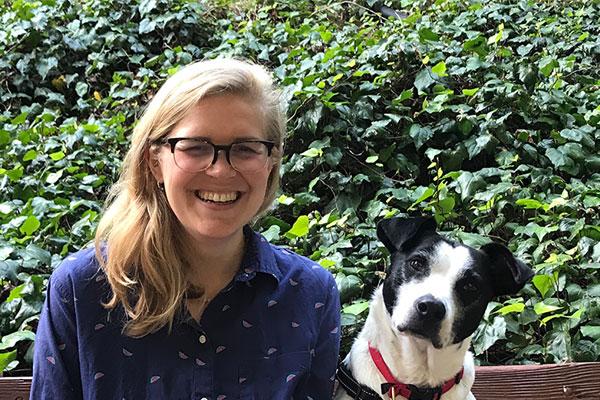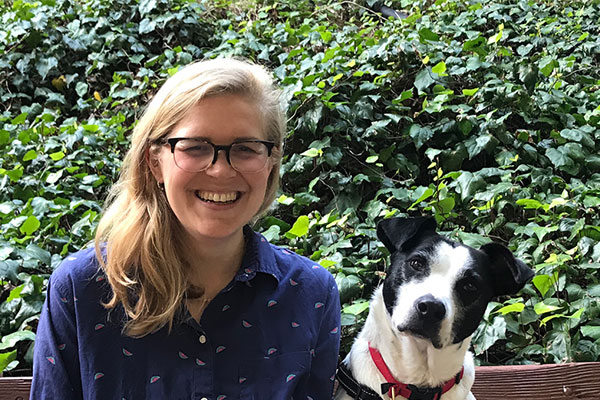

Through her research and activism, Amy Rosenwohl-Mack advocates for those whose voices are rarely heard. The UK native and Nursing PhD student focuses her research on vulnerable populations such as the elderly, the LGBTQ community and those battling substance abuse.
Rosenwohl-Mack shared some of her work at the 13th Annual Health Disparities Research Symposium on Oct. 11, 2019. Learn why Rosenwohl-Mack came to UCSF, why she’s so passionate about health policy, and what she misses about being away from the UK.
Age: 31
Hometown: King’s Lynn, UK
Program: PhD in Nursing (studying health policy)
Focus: Aging and health inequities
Why did you choose the UCSF School of Nursing to pursue your doctoral studies?
It’s a unique opportunity to develop health policy expertise in a setting that values the specific contributions and perspectives of nurses. My clinical and research interest is in access to in-home care and services for older people, and there is so much expertise at UCSF in health policy and in the politics of care for older people. I particularly appreciate the strong training in qualitative research, and enjoy working alongside sociology students in the School’s Department of Social and Behavioral Sciences.
Why focus on health policy?
Nurses are perfectly positioned to advocate for policy change – we see the effects of poor policy on the everyday lives of the people we care for, and we are great at building rapport and communicating with patients, providers and the public. People put a lot of trust in nurses at some of the hardest times in their lives and for me, this comes with a responsibility to speak up and use our position to influence policy. In addition, I trained in the UK’s National Health Service, a universal health care system, and this informs my interest in how insurance coverage and access to services affect health.
You presented at the Health Disparities Research Symposium on Oct. 11. What was your topic and why is it important?
My talk was about symptoms of Hepatitis C among people who inject drugs. Hep C disproportionately affects vulnerable populations, especially people who inject drugs, but it remains underdiagnosed and undertreated. In San Francisco, I often hear people talking about the “problem” of homelessness and drug addiction, but we rarely listen to the voices of those who are directly affected. In the qualitative study I referenced in my talk, people told us about how Hep C affected them and the barriers that made it difficult for them to get treatment. I hope that sharing our findings will help improve treatment access to reduce the burden of this disease.
You’re involved in numerous studies analyzing members of the LGBTQ community with respect to aging, housing situations and health outcomes. Why is the LGBTQ community an important focus for you?
I’ve been involved in queer activism and community-building in my personal and professional life for a long time. Now that I’m in the PhD program, it feels important for me to use my research skills to support the LGBTQ community too. Older LGBTQ people did so much to fight for the rights that I often take for granted, like being able to marry my wife and be open about who I am at work. Now, many are experiencing health disparities and feeling unsafe and threatened in care settings. For people who came to San Francisco because it was a safe haven for the queer community, it’s especially painful to feel rejected and forgotten. We have so much to learn from our elders and a lot of work still to do to eliminate health inequities for LGBTQ folks and others whose health is threatened by discrimination and oppression.
What motivated you to become a nurse?
I was originally a literature major, but I got a part-time job as a Certified Nursing Assistant in college. I knew immediately that nursing was what I wanted to do with my life. Being a nurse is such a varied, active job, and I find it very satisfying to be responsible for coordinating all aspects of a person’s care and thinking about everything that can affect health and wellbeing. I love getting to know people in the context of their families and communities, so palliative care, community/home health, and case management suited me perfectly. It’s a challenge to bear witness to human suffering and injustice, but it’s important and valuable to be there as well. I’ve learned a lot about how people cope in very difficult situations.
What has your experience at UCSF and the School of Nursing been like?
I’ve had excellent teaching and support in my program, especially in qualitative research methods, and I’ve enjoyed working with people from other disciplines including sociology, epidemiology and medicine. My mentors have shown me how researchers can work in close partnership with communities, following their lead rather than simply imposing our academic priorities on them. Some of the best experiences I’ve had at UCSF have been outside my program, through the Do No Harm coalition and the Associated Students of the School of Nursing. I feel very lucky to get to work with amazing student leaders in other programs and schools here, learning how best we can use our voices and our visibility as health care professionals to advocate for the health of all communities.
Any differences in nursing education between the U.S. and UK?
PhD programs in the UK are much less structured – most people start their doctoral research immediately rather than taking classes for the first few years. I’m glad to have had the opportunity to build community with other students and to receive thorough training in methods and theory before moving forward with my research.
What do you miss about London?
Universal health care. And the rain – genuinely!
